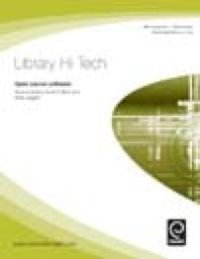
Ebook: Open Source Software
Author: Scott P. Muir, Mark Leggott
- Tags: Library science., Open source software., COM051390, LAN025000
- Series: Library Hi Tech
- Year: 2005
- Publisher: Emerald Publishing Limited
- City: Bradford, United Kingdom
- Language: English
- pdf
Every so often one needs to take a slightly different path and see how the other halflives and works. That is what I did when I attended Access 2004, a Canadian librarytechnology conference. I had heard good things about this conference, and adding tomy interest was the preconference on Institutional Repositories that tied in with aproject I was to address in my current job. On the same day as the preconference wassomething called a Hackfest, which, unfortunately I had to miss. Little did I realize howfascinating the Hackfest could be!At Hackfest a group of people get together and review a list of technology problemsor needs have been submitted by libraries. The participants select a problem they wantto work on and breakout into small groups where they spend the remainder of the dayfocusing on solutions. I was stunned at the end of the conference to hear the reportsfrom Hackfest and see that several people had actually begun to code an Open SourceSoftware (OSS) solution to their topic. Some groups estimated they were close to 25percent done – in just a few days, while attending Access Conference sessions all day.Additionally, throughout this conference, I heard the names of other programs such asCUFTS/GODOT that had been developed and were in use in Canadian libraries, someof them outcomes of previous Hackfests. An article about the Hackfest is availableonline (http://wiki.uwinnipeg.ca/index.php/LoomWareWiki:Hackfest).I was awed at what I saw and heard, and I wondered why I didn’t know what wasgoing on in the libraries of our neighbors to the north. I was also fascinated that insteadof griping about the problem or complaining about the vendor not delivering the idealsolutions, these librarians and programmers had set about solving the problem. Thisled to the idea that an issue of Library Hi Tech describing what is happening with OSS applications in universities and libraries (particularly Canadian institutions) wasworth sharing. In addition to developments in Canada, we also have examples from theUSA and one from New Zealand.There is a wealth of information on OSS applications in libraries and in othersettings so I will only cover that briefly. The actual beginning of OSS is hard to define,but it is at least 20 years old (Cervone, 2003). A key definition for OSS is access to theactual source code, often available under GNU Public License, which allowsprogrammers to alter the software and redistribute it, with the requirement that theymake these changes available to other developers. The licenses associated with OSSprevent commercial entities from making these products proprietary (available at:www.gnu.org/copyleft/gpl.html).OSS is sometimes called “free” software but as one author explains, ““free” is usedas in the phrase “free speech” (a right we covet), rather than the phrase “free beer”(always too good to be true) or “free kitten” (which sounds good, but has a highoverhead)” (Phipps, 2004). The GNU web site offers the following definition of OSS:. The freedom to run the program, for any purpose (freedom 0).. The freedom to study how the program works, and adapt it to your needs(freedom 1). Access to the source code is a precondition for this.. The freedom to redistribute copies so you can help your neighbor (freedom 2).. The freedom to improve the program, and release your improvements to thepublic, so that the whole community benefits (freedom 3). Access to the sourcecode is a precondition for this (www.gnu.org/philosophy/free-sw.html).One of my earliest experiences with an OSS-like environment was as a customer ofNOTIS. While it doesn’t meet many of the criteria of today’s OSS environments, thereare some similarities. Due to the early history of Northwestern University giving awaythe software, including the source code NOTIS Inc., continued this practice ofsupplying the source code when the software was purchased. When we as customersencountered a feature that did not work the way we liked, many simply rewrote thecode to get the desired functionality. People shared their locally developed code withtheir fellow customers and assisted with its implementation at other sites. In a fewcases, NOTIS, Inc., contracted with customers to develop specific enhancement to thecode. However, unlike today’s OSS, NOTIS rarely incorporated their customer’s codeinto the base program. This created the challenge of reintroducing the local codingchanges with each new release and testing to see that they still worked.So why has OSS taken off now? Perhaps one of the key reasons is that theInternet allows for the rapid dissemination and sharing of such programs,communication about the product, and easy sharing through various internetcommunication tools. A recent article in First Monday states that, “Software is rapidlybecoming one of the most fundamental building blocks of human ‘interaction andactivity’ (Klang, 2005) and OSS software ties in nicely with the not-for-profit conceptsof most school, academic, and public libraries”. Previously published in: Library Hi-Tech, Volume 23, Number 4, 2005
Download the book Open Source Software for free or read online
Continue reading on any device:

Last viewed books
Related books
{related-news}
Comments (0)